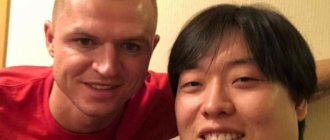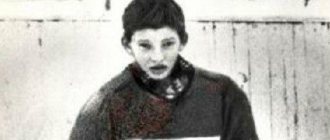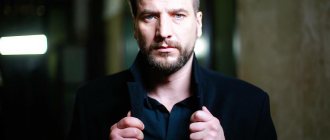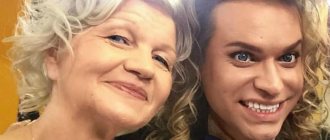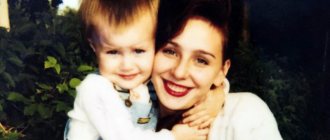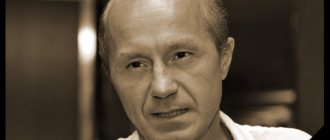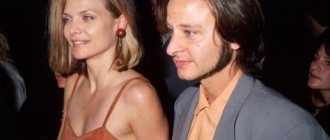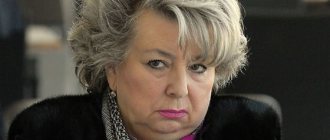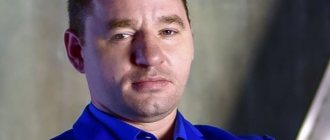He stood at the origins of Soviet hockey and won three Olympics
April 12, 2020
Anatoly Tarasov won the USSR hockey championship 17 times as a coach. Photo: sport-express.ru
Anatoly Tarasov is a legendary Soviet hockey coach. With the USSR national team, he won the Olympic Games 3 times and the World Championships 9 times. Tarasov started out as a football player, led CSKA throughout his career and became famous for his hard training. We talk about the biography of the famous coach.
Tarasov lost his father early
Anatoly Tarasov was born on December 10, 1918. Tarasov’s mother worked as a seamstress, her father as a dray driver. In 1923, Anatoly's brother Yuri was born.
Anatoly could have been the third child in the family, but his two older brothers died in infancy.
Tarasov's father left the family in 1927. Anatoly remained the eldest man in the family. He raised his younger brother and helped his mother maintain the household.
In one of his autobiographies, Tarasov recalled that as children, he and his brother often collected flowers and mushrooms to sell them on the street. So the boys helped their mother support the family.
As a child, Tarasov was a sporty child. He constantly played football and hockey during breaks and after school.
Tarasov lived next to the Dynamo stadium, so he went to the blue and white section
In 1929, Tarasov’s mother took her son to the “Young Dynamo” sports school, because the Blue and White stadium was located next to the house. Anatoly studied in the section for 8 years. At the same time, he graduated from secondary school and a vocational technical school, becoming a mechanic.
In 1937, Tarasov went to study at the Moscow Institute of Physical Education to become a trainer. In parallel with his studies, he played in amateur football teams.
In 1939, Tarasov graduated from university and began his professional career as a football player. He began to play for Dynamo Odessa.
Dynamo failed the 1939 season. The team lost 13 of the first 17 matches in Group A of the USSR Championship. After an unsuccessful half of the season, the team management fired the coaching staff and relied on youth. This is how 21-year-old striker Anatoly Tarasov joined the team. In the 1939 season, he managed to play 11 matches and score 3 goals. The newcomer's game did not help Dynamo - the team finished last and dropped into Group B of the USSR Championship.
Tarasov was noticed by the coaches of CDKA, one of the strongest teams of that time. In 1940, the young football player played for the army team. Tarasov did not become the main player of CDKA. He played only six matches and never scored. Despite the unsuccessful performance, Tarasov remained in the team for the next season, but the 1941 championship was not completed due to the war.
At CDKA, Anatoly Tarasov played together with the legendary football player and hockey player Vsevolod Bobrov. Photo: pressball.by
Players from leading football teams were not sent to the front. Tarasov served in Moscow. He guarded important strategic sites. In October 1941, German troops came close to the city. Tarasov was evacuated from Moscow to Arzamas. Two months later he was returned to the capital. In 1942, Tarasov completed officer courses and by the summer of 1945 became a senior major.
Information about biography and professional achievements
In 1937, the young man was able to take up sports more professionally, for this reason he entered the Higher School of Coaches, where he was taught the necessary knowledge and skills by the best teachers; this educational institution was organized at the Moscow Institute of Physical Culture.
Anatoly Tarasov: photo
Since the young man at that time already had some practical knowledge of the game, he also wanted to learn something from theory in order to apply his knowledge in the game.
Just a couple of years later, the young man was invited to become a coach at one of the fairly famous football clubs “Dynamo”, which was located in Odessa. Already at such a young age, the young man was able to attract a lot of attention from more famous coaches and athletes; people often wanted to know more about the biography and family of Anatoly Tarasov.
Many managers noted that this man was different from other trainers, since at the age of twenty he had very distinctive and outstanding abilities.
When a long war began, the man tried to stay in the barracks located in Moscow, as he wanted to see his loved ones more often and be close. In those days, the young man was trained in hand-to-hand combat, and then his detachment was stationed as guards at the central house of the Soviet army. When the war ended, the young man’s family was allocated a separate room in a communal apartment, and almost immediately after that, a great army football coach named V. Arkadyev recommended that Tarasov be enrolled in the Air Force Moscow Military District sports club.
Anatoly Tarasov in his youth
The first season of the championship, in which the USSR hockey team participated, was not as successful as desired, and the team took only fifth place, but at the same time Tarasov himself also played along with his hockey players and personally scored fourteen goals, for which many called a sniper. Thus, Anatoly showed himself as an athlete and a coach at the same time. Just a few years later, the young man was able to train his team so that it became a permanent presence on the leaderboard. A little later, the young man was enrolled in CDKA as a playing coach, today this team is called CSKA, and here all the coaches remembered Anatoly as the best theoretician, and the players invited their coach to play with them. At that time, the biography, personal life and children of Anatoly Tarasov were very vigorously discussed on television; biography photos often flashed on the air, because the man had achieved enormous success.
When the young man’s career was just beginning, he was able to coach the Moscow national team, which later formed the USSR hockey team. At that time, the national team was supposed to take part in a game against Czechoslovakia, so it turned out that until Anatoly was appointed head coach of this team, he also acted as a player and could coach the teams. While working with the team, Tarasov’s teams were able to win with a score of 6:3, and from 1948 to 1950, the athlete received the title of champion of the Soviet Union three times. Also in 1949, the man received his award as Master of Sports of the Soviet Union.
Anatoly Tarasov - famous coach, sports legend
The man personally played on his team, for this reason he could show by his own example exactly how to perform maneuvers and bypass his opponents; he was excellent at showing his skills to his players. Many players claim that Tarasov was always quite strict and took the game very seriously; he directed his team only to win. If you look at the video recordings of each championship or game, you can see that the man was very emotional and anxious about the dangerous moments concerning his team, he was sincerely worried and successfully achieved his victory. Although there were cases when he left quite difficult moments of the game without his attention at all, he treated them as calmly as possible. During the times of the Soviet Union, one can count exactly one hundred matches won in which Anatoly played, and during all this time it was he who was able to score 106 winning goals against the enemy.
When the team was renamed CSKA, Tarasov also remained its coach; it was he who was the head coach of this team until 1975, and for almost thirty years Anatoly worked with his players. During this time, the man tried to devote himself as much as possible to the profession and helped his students adopt their skills. It was under his leadership that the team became the winner of the championships of the Soviet Union for several years in a row, and the team was awarded nearly eighteen gold medals.
Anatoly Tarasov - a sports legend
In 1957, Tarasov was awarded the title of Honored Coach of the Soviet Union, and already in 1958 the man was invited to become the head coach of the USSR national team; it was with Tarasov that the team won the championships nine times. In addition, Anatoly prepared his athletes to participate in the Olympic Games, where the team received their gold three times. Many famous hockey players today became his students; together with Tarasov they followed their own path to success and glory. At that time, the biography, personal life and children of Anatoly Tarasov in the photo were increasingly discussed in newspapers and on television, the man had many admirers and admirers.
Many people know that in the 1972 Olympic Games the Soviet Union team was able to get their long-awaited victory, but when the competition was over, Tarasov and Chernyshov decided to leave their post. The whole point was that the leadership from above demanded to play a draw with the Czechs, but Tarasov’s team won with a score of 5:2, the victory was crushing, but the authorities did not approve of Anatoly’s behavior. Since the coach was able to lead his team to victory, he should have been officially and solemnly presented with the Order of Lenin, but they refused to hold this ceremony.
Anatoly Tarasov and his team
At one time, the man was also able to defend his dissertation, which allowed him to become a candidate of pedagogical sciences. Many still remember this great man, because his contribution to the development of domestic hockey is truly invaluable. Not only famous hockey players speak positively about him, but also many coaches who are at least a little familiar with the biography, personal life and children of Anatoly Tarasov. Unfortunately, the man died in 1995, but no one in hockey has forgotten about this great coach.
Tarasov played in the first USSR ice hockey championships
From 1942 to 1945, there were no USSR football championships, but the Moscow bandy championships were held. Tarasov played at this tournament for CDKA.
Since 1946, new sports began to be popularized in the USSR. One of them was ice hockey, which was then called “Canadian hockey.” The teams were mainly formed from representatives of bandy, which was developed in the USSR.
In 1946, Tarasov played on the Air Force football team. From 1947 to 1953 he played for the hockey CDKA. At that time, ice hockey was poorly developed in the USSR. There were no professional coaches in the country, so the functions of mentors were performed by experienced hockey players. Tarasov was one of the playing coaches of CDKA.
In addition to coaching, Tarasov was engaged in journalism. He worked as a columnist for hockey matches in many publications, including the Soviet Sport newspaper and Ogonyok magazine. In his notes, Tarasov did not hesitate to criticize his rivals. For example, he spoke negatively about the game of Spartak and wrote about the style of the red and white: “Any system of play built on individual principles in our sport is doomed to failure.”
In 1948, Tarasov participated in three games of the Moscow national team against the Czech club LTC. In the first meeting, the Soviet team won (6:3), lost in the second (3:5), and drew in the third (2:2). These were the first international matches with the participation of Soviet hockey players.
At first it was planned to conduct only joint training of Soviet and Czech players. However, the hockey players insisted on holding full matches. Tarasov described these events in different ways in his autobiographies. In 1966, he wrote that the decision to hold matches was collegial, and in 1993 - that he personally insisted on a series of games with LTC.
Throughout his career, Tarasov led CSKA
In 1950, Tarasov ended his playing career. He headed the CDKA and coached the team for 24 years. With the “army” club, Tarasov won the USSR Championship 16 times and the National Cup 8 times.
The “Army” club changed its name three times when Tarasov was the coach. In 1951, the team was renamed CDSA, in 1957 - CSK MO, in 1960 - CSKA.
Many famous hockey players trained at CSKA under the leadership of Tarasov, including the legendary goalkeeper Vladislav Tretyak.
Photo: ria.ru The players recalled that Tarasov was demanding. His training was hard and intense. He constantly came up with new exercises and paid a lot of attention to the physical fitness of the players.
Hockey player Alexander Gusev talked about some of Tarasov’s training: “There was an exercise ‘beat the Canadian’. You run and hit a tree with your shoulder. Tarasov made sure that no one slowed down in front of the barrel. He took us outside the CSKA palace, to the airfield. There we did somersaults on the stones. Then we take off our T-shirts: who is bleeding, who has a blue back. But the real hard labor is when they put a 10-kilogram lead belt on you. You spend the entire training session wearing it. Or tied to the board with a rubber band. You squirm forward, he pulls you back. You have to fall on one knee, then on two.”
Tarasov was a good motivator and found a common language with hockey players. Despite the difficult training, the players respected the coach and did not conflict with him.
Many famous players trained under Tarasov's leadership: goalkeeper Vladislav Tretyak, defender Alexander Ragulin, forwards Valery Kharlamov, Boris Mikhailov, Vladimir Petrov, Anatoly Firsov.
Anatoly Tarasov: “Father of Soviet hockey”
In the most authoritative Encyclopedia Britannica, Tarasov is called the “father of Russian hockey.” Although he shares these laurels with his long-term partner in a coaching tandem at the head of the invincible Soviet national team of 1960 - early 1970, Dynamo player Arkady Chernyshev.
To say that Tarasov was obsessed with hockey is an understatement. He, figuratively speaking, breathed this game.
“Tarasov was very demanding. Even after the victory, he pointed out mistakes to everyone. This is not very pleasant, but the player, willy-nilly, thought about his actions. In the educational and training process, he paid attention to every little thing; if something didn’t work out for someone, he forced them to work twice as hard. And if you’re a minute late, then you’ll be in trouble... I remember I was late somehow. First of all, Tarasov ordered me to somersault over my head on the ice. Then at the end of the training he gave the most difficult tasks, then the so-called accelerations from blue line to blue, from red to blue... Rarely anyone was late. And there was always order with the regime,” recalled Vitaly Davydov, talking about training under the guidance of the hockey master.
At one of the training sessions of the USSR national team in the first days of the 1971 World Cup in Switzerland, an interesting episode occurred. After the skate, Anatoly Tarasov left forwards Shadrin, Zimin, as well as goalkeeper Tretyak on the ice. The coach simulated a game situation, telling one of the players to shoot at the goal, and the other to push Tretyak and interfere with him in every possible way. Shadrin and Zimin became embarrassed, refusing to “beat Vladik.” “What are you doing, my dears! - Tarasov became furious. “We found muslin young ladies here!”
After training, Tretyak left the ice covered in bruises and abrasions. “It happened that someone would throw at point-blank range, and I would swing my stick at this player with resentment: “Are you trying to kill me?” And Tarasov was right there: “Oh, are you in pain, young man? You don’t need to play hockey, but play with dolls.” Then it hurts." Enjoy your workout. Rejoice!” Subsequently, many times I recalled those lessons with gratitude,” the famous goalkeeper wrote in his book.
“The Russians had iron discipline not only in everyday life, but also on the playground. The slightest deviations from it were not only not welcomed, but were punished in every possible way,” admitted one of the best players in the history of Czechoslovak hockey, Vladimir Martinec. In his opinion, it was almost impossible to defeat Soviet hockey players, who trained from morning to evening under the guidance of such fanatically devoted people to the game as Tarasov.
Photo:
Alexander Makarov/RIA Novosti www.ria.ru
Anatoly Vladimirovich never gave the same exercises during training, constantly improvising. “Tarasov had a million exercises - and with what sayings! I can’t tell you... People’s Artist, he didn’t repeat himself. I gave 22 years to CSKA, 10 years as a player - sometimes it seemed that I knew all his habits, I could imagine what would happen in the next minute...,” one of the most famous domestic coaches, Yuri Moiseev, later recalled in an interview with Sport Express. “And something completely different happened.” Man of genius! He could have achieved success in any field - we are lucky that he played hockey. If there were no Tarasov, there would be no hockey in Russia. All his life he was looking for something new, and other clubs adopted what he found. What erudition! I came to the installation with Stanislavsky’s book “My Life in Art”.
“He was always on skates, could lie down under the puck himself during training, and often did exercises with everyone else. Emotional, lively, demanding, Anatoly Vladimirovich ignited everyone with his enthusiasm and at the same time vigilantly monitored the work of each player. His character was tougher than Arkady Ivanovich’s,” recalled Vitaly Davydov. “He was a stick for us, while Chernyshev was a carrot.” Arkady Ivanovich and Anatoly Vladimirovich complemented each other perfectly and made up a brilliant coaching duo. The temperamental Tarasov sometimes lacked patience. If the team started to lose, he immediately suggested shuffling the units and changing tactics. “Well, wait, don’t rush,” Arkady Ivanovich admonished him.”
“We didn’t always understand whose plan—Chernyshev’s or Tarasov’s—we were playing in the next match. Their unanimity at crucial moments, in my opinion, was most likely explained by the fact that neither one nor the other graduated not only from the Higher School of Coaches, but also from the Institute of Physical Education. Therefore, in sports situations, they always listened to each other’s opinions, which once again only emphasized their mutual respect, including knowledge, although they had different roles in the team: Arkady Ivanovich was the organizer, the brain of the team, and Anatoly Vladimirovich was strong in training process, so he conducted classes more often with his partner,” admits Vitaly Davydov. “But the main thing that united Chernyshev and Tarasov was that they were coaches from God with amazing intuition and understanding of the game, so no matter what path they took to achieve a high goal, they often achieved it.”
As hockey veterans recall, Anatoly Tarasov came to training not only with hockey manuals, but also with a volume of Chekhov. Moreover, not just with stories, but even with a book of letters from Anton Pavlovich to his brother, Mikhail. Tarasov in such classes at CSKA and in the national team was the very movement, passion, energy. In front of a large crowd of public, journalists who loved to watch him at these moments, he sometimes picked up the microphone, although the hockey players could hear him perfectly well. “God was at Tarasov’s training!” - this phrase belongs to Valery Kharlamov, one of the master’s favorite students. The coach worked to the limit of his strength, and demanded the same fanatical attitude towards hockey from his students. Just one phrase from Tarasov speaks about this: “It’s not enough to assemble star players into a team; the coach also needs to fit this team.”
“Tarasov led the training with enthusiasm, fired up the guys, was strict with those who were lazy, and came up with interesting exercises. It demanded a lot, but we got excited and worked conscientiously. Sometimes one of the guys wanted to trick Tarasov, but everything ended in his favor,” recalled CSKA and national team captain Boris Mikhailov. — Arkady Ivanovich Chernyshev had a strong nervous system, I never saw him hot-tempered, it was impossible to unbalance him. Even when we were losing the most important matches, Tarasov literally rushed along the bench, and Chernyshev calmly stood at the side, not showing any excitement.”
Photo: Igor Kostin/RIA Novosti www.ria.ru
Anatoly Tarasov truly was a “fountain of emotions and passions,” a great workaholic with unique artistry. He structured his speech in such a way that his individual phrases, like “Yesenin of Russian hockey,” said about Maltsev, became proverbs and easily became newspaper headlines. It is no coincidence that when communicating with him, journalists expected some original impromptu from the sharp-tongued master: what if he himself provoked an argument with the reporters and began asking them questions. It is no coincidence that Tarasov was a godsend for photographers’ lenses and cameras during television broadcasts.
“I often attended the army team’s training sessions. He came to the CSKA stadium on Leningradsky Prospekt, climbed higher into the stands and watched for hours how Anatoly Vladimirovich worked with the hockey players. I was surprised that there was never repetition in these classes. Every time Tarasov conducted the training differently, in a new way,” the famous referee Yuri Karandin recalled in his book about hockey. “He was simply inexhaustible in coming up with tasks for the players, and at such a pace, with such variety and even, I would say, unexpectedly, he offered more and more new tasks, complicating them, increasing the load, that it could not help but captivate the athletes... A set of exercises, their sequence and various combinations - everything was subordinated to the specific task of the day set by Tarasov for the team. Let's say the next day there was a match with Spartak, and today at training Anatoly Vladimirovich appointed one five to play for Spartak, to play in their style, in their manner. So he directly defined: you are Starshinov, you are the Mayorov brothers... Keep in mind, he warned the others, these five usually act like this... they start an attack in this way... you can expect such moves from them.”
The very next day, in the matches that Karandin refereed, he easily guessed the game moves that the army team coach had practiced the day before with his players.
“He was distinguished by his exceptional ability to work,” Nikolai Epstein wrote about Anatoly Tarasov. — An active, non-standard person, he organically did not tolerate the calm, academic atmosphere in the team - he excited the players, emotionally motivated them to perform exploits. Although, in my opinion, he still lacked some of the humanity and flexibility that Chernyshev or Bobrov possessed.”
Anatoly Tarasov and team goalkeeper Vladislav Tretyak in training. Photo: Dmitry Donskoy/RIA Novosti www.ria.ru
Anatoly Tarasov’s element was to be in the thick of things on the ice and off it. Passionate, with all his heart worried about the game and the result, he could not sit still during matches, he constantly walked along the bench, finding some words for each hockey player. Moreover, he had such a peculiarity - the better things went for the team during the match, the more emotional and passionate Anatoly Vladimirovich behaved, so much so that his calls addressed to the players were heard not only by themselves and the spectators nearby, but also by the whole fan section adjacent to the bench.
The decisive game for the USSR national team at the 1971 World Cup was the game with the Swedes. The Soviet hockey players were losing by the third period of the meeting with a score of 2:3. And then an episode occurred that many national team players still remember. Tarasov, who seemed to be most worried about the final result, entered the dressing room of the USSR team in the second break, suddenly interrupted Chernyshev, who was setting up, and sang the anthem of the Soviet Union.
“What I remember most about this story is not Anatoly Vladimirovich’s singing, but Chernyshev’s subsequent reaction. Having waited until Tarasov finished singing, Arkady Ivanovich, barely restraining a smile, said quietly, but in such a way that everyone in the locker room roared with laughter. It looked something like this: “Well, you singer, why are you singing, can’t you be quieter!” Outwardly, everything looked extremely friendly, respectful and gentle. It was doubly funny that, speaking absolutely without malice and in a friendly manner, Arkady Ivanovich diluted this phrase with several strong words. Naturally, we relaxed, liberated ourselves and entered the third period with one desire - not just to defeat the enemy, but to crush the Swedish defense. Which, in fact, is what they did in the end,” recalls Alexander Maltsev with a smile. In the final third period, the Soviet team literally tore the Swedes to pieces, winning this period with a score of 4:0. The Soviet Union team then won gold at the world championships for the ninth time in a row.
I once touched on the topic of Tarasov’s “singing” in a conversation with Vyacheslav Ivanovich Starshinov, who worked under his leadership in the national team in the 1960s. “Tarasov sang before his debut game at one of the world championships in the mid-1960s, “Our proud Varangian does not surrender to the enemy.” But he didn’t sing during the break of the match, thereby trying to get us excited, not to the public, but more to calm himself down. The most amazing thing in this story was that during the performance of the first verse, Tarasov suddenly went to the toilet and the words of the famous song were heard to me from there. He came out satisfied, while making some movements with the palms of his hands, then folding them, then releasing them. Just like a Buddhist. Few people saw this. But we appreciated how the coach prepared himself for a long tournament. But that's not the main thing. Everyone, as they say, has their own butterflies in their heads. The main thing is that our team was super,” admitted Vyacheslav Starshinov.
Tarasov was not only a great psychologist, but also an amazing improviser. When the USSR national team was preparing for the upcoming Winter Olympic Games in 1968, he suddenly unexpectedly led the entire team into the pool, lined them up at the tower and said that now everyone present would have to jump into the water from a height of 10 meters down.
“Come on Borya, let’s be the first, set an example,” Tarasov turned to the captain of the Spartak team, Boris Mayorov. He took it and, at the suggestion of one of the wits, egged on the coach, saying, we don’t know how to jump down, is it too weak for you, Anatoly Vladimirovich, to set an example for the hockey players and jump into the pool yourself. Tarasov, an army man to the core, with his “special love” for the “civilian” Spartak players, was silent for a second and walked to the edge of the tower. Fortunately, there was a professional jumper nearby, who told Tarasov, who had never jumped from a tower before in his life, that “you need to go into the water with your head and under no circumstances push off from it.” Tarasov jumped into the pool. Following the advice of the swimmer, right in the training suit he was in, “ruffled and flushed”... Then for a whole year before his departure from the USSR national team, Boris Mayorov trained at Tarasov’s “special sight”.
However, to say that Tarasov spent 24 hours only thinking about hockey, burning his emotions left and right during games and training, would be completely wrong. Anatoly Vladimirovich was the first to learn from the Canadians the amazing ability to “get involved in hockey” only during games and training, to get excited on the ice only during the allotted time. He understood that if you focus on hockey and think about it all the time, you can not only burn out psychologically, but also physically strain yourself, with serious consequences for the body.
With such colossal loads, he knew how best to relieve tension after games and training. Tarasov went into the forest to pick mushrooms, and he knew how to dry, pickle, and salt them. “Everything dad took on, he did with passion. I was picking mushrooms. I salted cucumbers, cabbage, tomatoes, and apples in barrels. He repaired shoes for the whole family. “I planted the dacha with flowers and blue spruce trees,” recalled the coach’s daughter, Tatyana Tarasova. “When his legs started hurting, he put on hockey knee pads and worked in the garden. If there was a feast at the dacha, he always set the table himself. He could drink, but I never saw him drunk. And no matter what happened, no matter who was visiting us, at 21.30 my father went to bed. He just disappeared - that's all. When asked what to bring to the dacha, he always said: “Only a good mood.”
It is no secret that during his lifetime Anatoly Tarasov had many ill-wishers due to his obstinate, conflictual nature. “Tarasov was an inimitable master of creating conflict situations. He needed conflicts in order to prove that he was right and to successfully resolve them in his own favor,” Grigory Tvaltvadze admitted in a conversation with the author of these lines. “This is his difference from Arkady Ivanovich Chernyshev, who created an atmosphere within the team at Dynamo that in itself made it possible to avoid conflict situations.”
“Tarasov’s passion is not always useful for the team. Having forgotten, he can insult the player, humiliate his human dignity, and make an unfair reproach. The veterans are used to it and react to all this not so painfully, but the young ones, who are already terribly nervous in important matches, actually break down. Then the player will understand that the coach did not behave this way out of malice, that he wishes both the team and him, the player, victory and generally good things. But that will come later. And now, in the heat of the game, he is offended, undeservedly offended. After all, he also tries and wants the best. But the mistake was not explained to him, he was not listened to. And he cannot answer just as sharply, he has no right: the discipline in the team is military,” Boris Mayorov wrote in his essay for the magazine “October” back in 1969.
Over the years of Anatoly Vladimirovich Tarasov’s work in the club and national team, not everyone liked the fact that the legendary coach, thanks to whom we owe the appearance of the “Golden Puck” in our country, which discovered hundreds of talented boys, does not know how to calmly endure undeserved grievances. That he, already retired, is not satisfied with what has been achieved, striving to advise his followers on how to make the game of CSKA and the national team even better. The restless Tarasov, after his dismissal from CSKA, tried to interfere in the work of his successors in the club and national team.
The Canadian Museum of Hockey History and Glory in Toronto traces the entire history of the game. A select few, the best of the best, outstanding players and coaches are honored and remembered there. And where, until a certain time, Americans who played on Canadian teams but were not Canadian citizens were not even immortalized, in 1974 an artistic portrait of Anatoly Tarasov was placed. It was accompanied by the following text: “A. Tarasov is an outstanding hockey theorist and practitioner who has made a huge contribution to the development of world hockey. The world should thank Russia for giving Tarasov to hockey.” He became the first European in history to be awarded the right to enter the Hall of the Elect. Only years later they accepted the long-time head of the IIHF, Briton John Ahern.
“He was invited to work in America for three million dollars a year. When he died, he had one thousand dollars in his account,” recalled the hockey player’s daughter Tatyana Tarasova. “I still think: if my father had gone to America, he would not have died so early.” But they didn’t let him go, they didn’t even talk about the offers that were received. In his native country, he was first destroyed as a professional, deprived of the opportunity to work. And then, as a person, through negligence, I infected him with a fatal infection during an examination.” Anatoly Vladimirovich Tarasov died on June 25, 1995...
Tarasov was the second coach of the USSR national team when he achieved major successes
In 1958, Tarasov led the USSR national team. At first, the national team did not win status tournaments. The main achievement of the USSR was the bronze medals at the 1960 Olympic Games.
After third place at the Games, the leadership of the hockey federation decided to strengthen the coaching staff. Arkady Chernyshev, who led Dynamo Moscow, was appointed head coach. Tarasov remained on the team, but moved to the position of second coach.
Anatoly Tarasov and Arkady Chernyshev coached the USSR national team for 12 years. Photo: tass.ru
Tarasov and Chernyshev worked together until 1972. They did not have a strict division of responsibilities, but the players recalled that Tarasov was more responsible for the physical shape of the team and the motivation of the players. Chernyshev more often gave tactical instructions and dismantled his opponents. Under the leadership of two specialists, the USSR national team won the Olympic Games 3 times and the World Championships 9 times.
Tarasov and Chernyshev left the national team in 1972. There is an unconfirmed version that before the final match of the Olympics in Sapporo, the head of the USSR delegation ordered the team to play a draw with the Czechoslovakian team. This result would have been enough for the Czechoslovaks to take second place at the Games. The coaches did not agree to hold a fixed match. The USSR national team won – 5:2. Allegedly because of this, Tarasov and Chernyshev were fired.
Tarasov headed football CSKA for one season
Tarasov left the hockey team CSKA in 1974. In 1975, he headed the army football club. CSKA was in the middle of the USSR championship: in 1974 the team took only 13th place.
Tarasov trained football players in the same way as hockey players. The players received unusual loads and took a long time to recover. The football players did not like Tarasov’s methods, many of them were opposed to the coach.
Anatoly Tarasov at a CSKA football training session. Photo: sport-express.ru
CSKA, under the leadership of Tarasov, played primitive football. The Army team made a lot of crosses and often fouled. The players recalled that Tarasov wanted most of the passes to be directed forward. The coach punished for passes back and across the field.
Journalist Sergei Salnikov described the game of Tarasov CSKA this way: “The offensive design looks primitive, since it is built on hastily directed long passes and, most often, lobbed passes in the hope of tall forwards.”
In 1975, CSKA took 13th place in the USSR championship. The Army team won only 6 victories in 30 matches. This indicator was worse only for Rostov SKA, which took the last, 16th place - the team won 4 victories. After the season, Tarasov was fired, and he finally ended his coaching career.
Biography
Monument at the Vagankovskoe cemetery
Anatoly was about 10 years old when his father left the family[5]. Mother, Ekaterina Kharitonovna, worked as a seamstress and motor operator. He was the eldest man in the house and raised his younger brother Yuri.
The Tarasovs lived not far from the Dynamo sports complex under construction, and the brothers enrolled in the Young Dynamo sports hockey school. Possessing an ambitious character, Anatoly quickly became the leader and captain of the Dynamo youth bandy team, then the Moscow national team.
In 1937, Anatoly Tarasov entered the Higher School of Coaches at the Moscow Institute of Physical Education. At the same time, I tried to immediately put the acquired knowledge into practice. In 1938, in parallel with his studies, he began training his first team - the work team of Zagorsk.
In 1939 he graduated from coaching school and went to play for Dynamo Odessa. He was an attacking player. The team took last place in the USSR Championship, and at the end of the season Tarasov returned to Moscow, having received an invitation from the Krylia Sovetov team. He intended to play for this team in both bandy and football, but in February 1940 Tarasov was called up for military service; he was soon transferred to the CDKA football team. In the 1940 season, the team took 4th place; the 1941 championship was not completed due to the outbreak of the Great Patriotic War.
During the war he was on guard at facilities in Moscow; at the end of 1941 - a short evacuation to the city of Arzamas.
In 1942, he attended short-term officer courses. After that, he taught the Red Army soldiers hand-to-hand combat, shooting and other types of combat training[5].
In 1946, he was recommended by army football coach B. Arkadyev as a mentor in the football club of the Air Force of the Moscow Military District. Later, with the formation of the Air Force hockey team, Tarasov headed it too; was a player-coach. Since 1947 - playing coach of the CDKA hockey club. He was also a team player until 1953. Together with the club he became the USSR ice hockey champion in 1948-1950. Played 100 matches, scored 106 goals.
In 1950, a tragedy struck the family - his brother Yuri died in a plane crash in Sverdlovsk.
After finishing playing, he continued to be the head coach of CDKA, CDSA, CSK MO, CSKA (until 1974 with short breaks in January-November 1961 and June-November 1970). In this position he won the following titles:
- champion of the USSR (1948-1950, 1955-1956, 1958-1960, 1963-1966, 1968, 1970-1973);
- second prize-winner of the USSR championships (1952-1954, 1957, 1967, 1969 and 1974);
- third prize-winner at the USSR Championship (1962);
- winner of the USSR Cup (1954-1956, 1966-1969, 1973);
- finalist of the USSR Cup (1953).
In 1957-1961 - senior coach of the USSR national ice hockey team. In 1962-1972 - second coach of the USSR national team (senior coach - Arkady Ivanovich Chernyshev).
At the 1972 Olympic Games in Sapporo, an incident occurred, after which Tarasov and Chernyshev lost their posts in the national team. Allegedly, the coaches refused to follow the instructions of the political leadership of the USSR. The national team was required to play a draw with the Czechoslovakians so that the team from the socialist country would take second place. However, the score turned out to be 5:2 in favor of the USSR, the Americans took second place, and the coaches were suspended from work.
Under the leadership of Tarasov as a senior coach, the USSR national team became:
- third prize-winner of the Olympic Olympics (World Championship) (1960);
- second prize-winner of the World Cup (1958, 1959);
- European champion (1958-1960).
Senior coach Arkady Ivanovich Chernyshev and second coach A.V. Tarasov led the USSR national ice hockey team to the title of champion:
- Winter Olympic Games (1964, 1968, 1972);
- Ice Hockey World Championships (1963-1971);
- European Hockey Championships (1963-1970).
In 1975, already a renowned hockey specialist, he took over the football team CSKA, with whom he took 13th place in the Major League, after which he was fired.
Anatoly Tarasov founded the Golden Puck youth tournament.
In 1974 he was inducted into the Hockey Hall of Fame in Toronto. In 1997, he was among the first to be inducted into the International Hockey Federation (IIHF) Hockey Hall of Fame.
Recipient of the Wayne Gretzky International Award, presented by the NHL Hockey Hall of Fame to individuals who have made outstanding contributions to the game of hockey.
One of the divisions of the Kontinental Hockey League is named after Tarasov. The name “Anatoly Tarasov” is borne by the tugboat of the Northern Fleet of the Russian Navy[6].
Author of the book “Hockey. Founders and Newcomers,” published posthumously in Russia in 2020.
Died on June 23, 1995. He was buried at the Vagankovskoye cemetery.
Tarasov met his wife while studying at the institute
In 1938, Tarasov met his future wife Nina at a student camp. A year later, the young people got married. The day after the wedding, Tarasov went to Odessa to play for the local Dynamo. Anatoly saw Nina only during rare business trips to Moscow. The couple began to live together permanently only in 1940, when Tarasov moved to CDKA.
Tarasov lived poorly and did not have money to buy wedding rings. Anatoly gave his wife a ring only for their golden wedding in 1989.
Tarasov's daughter Tatyana became a famous figure skating coach
Anatoly and Nina had two daughters - Galina and Tatyana. Galina became a teacher. Tatyana is a figure skater and coach.
Anatoly Tarasov with his daughter Tatyana. Photo: tass.ru
Tatyana Tarasova was not an outstanding athlete. Her best achievements were silver at the 1965 USSR Championship and gold at the 1966 Universiade. As a coach, Tatyana has achieved great success. Tarasova's wards became Olympic champions eight times.
Personal life
The Great Tarasov entered into a legal marriage in the summer of 1939. His wife was Nina, a classmate who studied with him at the same educational institution. In the winter of 1947, the couple had a daughter. The happy couple gave her the name Tatyana.
Anatoly Tarasov with his wife and children
As even casual sports fans know, Tatyana Tarasova is now a famous Russian coach, for whom figure skating is her life’s work.
Anatoly Tarasov with his daughter Tatyana
Despite the fact that the family experienced considerable bitterness during the war years, in the 1950s the daughter of the legend skillfully stayed on the ice. Her father helped her do pirouettes, because children for Tarasov were one of the main values in life. The couple named their second daughter Galina (she died in 2009).
Facts about Anatoly Tarasov
- Tarasov wrote 8 books about hockey tactics and 2 autobiographies.
- Tarasov was inducted into the Hockey Hall of Fame in Toronto in 1974.
- Tarasov is one of the founders of the children's hockey tournament “Golden Puck”.
- 4 documentaries were made about Tarasov.
Anatoly Tarasov - laureate of the prize named after. Wayne Gretzky Award, which is awarded to individuals who have made outstanding contributions to the game of hockey. Photo: tass.com
- One of the KHL divisions bears the name of the legendary coach.
- Tarasov loved the bathhouse very much. The coach’s friends recalled that he could steam all day and even hold business meetings in the bathhouse.
- Anatoly Tarasov died on June 23, 1995. He was buried at the Vagankovskoye cemetery.
Death
The life of Anatoly Vladimirovich was tragically cut short on June 23, 1995. A fateful coincidence of circumstances, the price of which is a terrible death. When taking tests, a deadly virus entered Tarasov’s blood, and it was this that caused his death. The infection triggered a stroke, which only accelerated the athlete’s departure.
Grave of Anatoly Tarasov
Anatoly Tarasov died in the hospital. The legend's grave is located in Moscow, at the Vagankovskoye cemetery.
